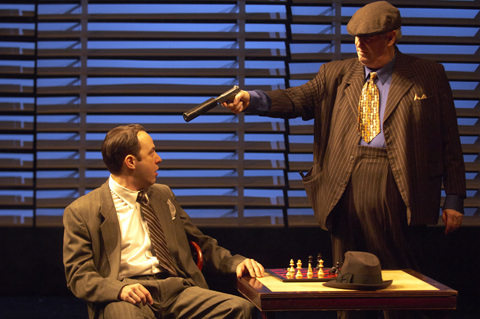
BUSINESS END James Glossman brings Raymond Chandler’s Philip Marlowe to the stage. |
Dead guys, mysterious dames, mobsters, dirty cops, and a handsome array of handguns are all in a night's work for Philip Marlowe, novelist Raymond Chandler's quintessential LA private eye. Immortalized in the classic noir films The Big Sleep and The Long Goodbye, Marlowe now appears on stage in new adaptations, by James Glossman, of Chandler's short stories "Red Wind" and "Trouble is My Business." Glossman also directs this world premiere, Trouble is My Business, in a visually enticing ensemble production at Portland Stage Company.
Gritty circumstances take Marlowe (David Mason, recently of PSC's Last Gas) among several echelons of pre-war Los Angeles society, encountering tycoons with excellent Scotch as well as two-bit speedy stooges staking him out. These disparate characters are played in ensemble style by five nimble actors — Ron Botting, Daniel Noel, Paul Murphy, Leigh Poulos, and Dustin Tucker — in two intricately narrated plots involve a man gunned down in Marlowe's bar and the woman he was looking for, and later a clever heiress Marlowe is hired to smear. And on stage throughout it all, to provide Marlowe with liquid solace and us with a soundtrack, is a bartender/piano player (Anthony Blaha), who pours shots, tickles the ivories, and occasionally gets in an aside or two.
Mason's private eye feels perhaps a little under-boiled, but he does well conveying Marlowe's wryness and clarity of vision. Poulos is sharply costumed and stylized, in her sequence of fashionably affected women, and the other four actors are entertainingly versatile in the range of vibrant cop and mobster types.
The plots' details become a little labyrinthine; the greater attraction here is this era of LA as a landscape and a mood. The city's lights and darknesses, heights and lows are lovingly, ravishingly rendered by PSC's crew: Multimedia designer Jeff Knapp projects gorgeous black and white photographs — the skyline at night, Grauman's Chinese Theatre, the mission-white Zephyr Club — against the back wall. Anita Stewart's sets evoke both bare-bones grit and plush Art Deco luxury. Huge window blinds sometimes splinter Bryon Winn's moody lighting. Between all that and piano player Blaha's languid original tunes, PSC delivers a gorgeous evocation of the genre, a nod to the idea that noir itself is to some extent less a story than it is a portrait of a time, place, and ethos.
That said, there is a lot of story at play here, with exposition that at times becomes exhausting, and on stage the noir mood often turns tongue-in-cheek, self-reflexive, even campy — at one point a matronly agency head is even played in by Murphy in drag. Gags like these are a little mystifying, but are perhaps the production's implicit acknowledgment that the genre can't translate closely on stage: Consider that in either a novel or a film, we can alternate between, in effect, close shots and long shots, between the hero's craggy face and internal monologue, and his dark larger world — a juxtaposition that's central to noir themes. On stage, this becomes a much more verbal than visceral experience. Ultimately, Trouble is My Business functions as a homage to the detective genre, rather than the beast itself.